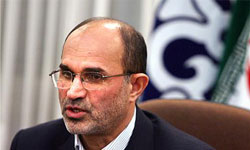 TEHRAN (FNA)- Iran’s 2009/10 budget is expected to be based on an oil price of $37.50 per barrel, a “logical” level in view of last year’s price fall, Oil Minister Gholam Hossein Nozari said Sunday.
TEHRAN (FNA)- Iran’s 2009/10 budget is expected to be based on an oil price of $37.50 per barrel, a “logical” level in view of last year’s price fall, Oil Minister Gholam Hossein Nozari said Sunday.
An Iranian newspaper last month said the government and a parliament committee had an initial agreement to base the budget running from March on an oil price of $45, lower than previously suggested. Iran is the world’s fourth-largest oil producer.
“The price of oil in next year’s budget has been envisaged at $37.5 (per barrel) which seems to be a logical price considering the drop in prices,” Nozari said.
” We should also be careful not to lose our main customers,” he continued.
The web site of the state broadcaster IRIB carried a similar report, saying the government and parliament had agreed on this price for the budget, which has yet to be presented to the legislature.
Oil prices have plunged by some $100 per barrel since mid-July to around $46, pulled down by a slowing world economy.
Economists say Iran’s government would likely have to cut spending in 2009, unless crude prices rebound to $80 or so.
A government official said in October Iran was planning for an oil price of $55 to $60 in the next budget, but oil prices have continued to slide since then.
The oil price set for Iran’s budget indicates government expectations but does not give a full picture.
Economists said last year’s budget was officially based on a price of about $40 a barrel but, when withdrawals from an oil revenue reserve fund and other crude-related earnings were taken into account, the state needed $70 or more to balance its books.
The government has been seeking to reduce subsidies, a heavy drain on state coffers, including discussing utility bill hikes.
Iran is the second biggest oil producer in the Organization of Petroleum Exporting Countries (OPEC), which pumps about 40 percent of the world’s oil.
OPEC decided in a December summit to cut output by 2.2 million barrels per day (bpd) starting in January in a bid to halt a sharp slide in oil prices, which have dropped from over $147 a barrel in July to about $46 due to falling demand.
The latest OPEC decision brings total cuts by the group from its September 2008 production levels to 4.2 million bpd.
Nozari added that the global financial crisis will prompt lower oil demand in 2009 and urged OPEC members to remain committed to their new reduced quotas.
A senior Iranian oil official said on Saturday that OPEC could meet in February – a month before its next scheduled meeting – to review the situation of crude markets for January.
“Maybe there is an idea that we may evaluate oil performance in January, therefore we may meet in February in Kuwait. But I have not seen any official invitation from the secretary-general or the president of OPEC,” Iran’s OPEC Governor Mohammad Ali Khatibi told Reuters.
Some OPEC ministers will attend an Arab economic summit scheduled for Jan. 19 in Kuwait, which OPEC President Chakib Khelil said could be a forum for the group to evaluate the oil market and decide whether to hold an extraordinary meeting before March.
 Eurasia Press & News
Eurasia Press & News